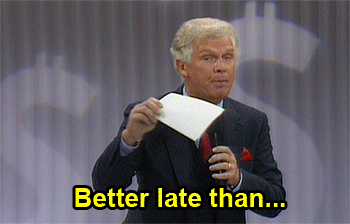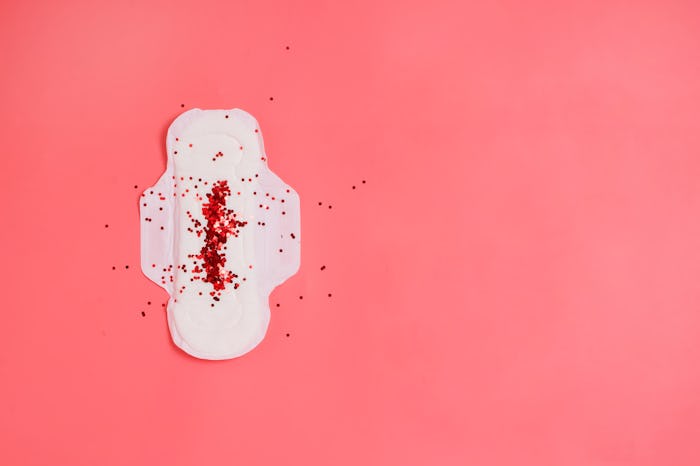I'm a firm believer in the idea that it's always better to know something. Even if knowing is painful or complicated or takes away an important, comforting belief, we cannot make the world better until we can all operate from a place of truth. But every now and then, something shakes this fundamental belief; an exception that defies the rule. For example, there are things I'm glad no one told me about postpartum periods. There are many reasons why, too, from practical to emotional, but I'm still not sorry I went into the whole business largely unaware.
Look, I'm going to give you a chance to confront your postpartum periods blissfully ignorant, as I did. If that's what you truly want (and I don't blame you) click away now. However, if you really want to know some hard truths (and there's merit and nobility in that), read on. OK, are we ready? Here's the first hard truth:
There is literally no way to prepare for postpartum periods. Why? Because they're all completely different. Even from birth to birth! My postpartum periods after my first child looked different from my pre-pregnancy periods, which both looked vastly different from what was going on betwixt my legs after the birth of my daughter. So I feel like, no matter what I've read or heard or learned, this information would have been completely useless. Because either it wasn't going to be true for me and I'd fret about it for no reason, or it would be true and there'd still be no way for me to adequately gird my loins (like... literally). It's like in Greek mythology, when the great heroes try to avoid a dark prophecy and, in their frantic maneuvering, walk right into it. And if you think a comparison to Ancient Greek literature is hyperbolic, then you've never had a postpartum period.
Here are just some of the things I'm glad I didn't really know:
The First Six Weeks Don't Even Count
Kind of. Basically, the first six weeks of stuff pouring out of your poor, tired vagine is considered postpartum discharge called "lochia." Lochia leaves your body in three stages of varying length, lasting anywhere from one to six weeks. Lochia rubra is the first stage and lasts between one and four days and looks like someone was murdered in your undies. Don't panic. It's normal... and also often chunky. (I'm so sorry to be the one to tell you that.)
The second stage is the shedding of lochia serosa, which is brownish red and mucusy and can last from four to 10 days. The next two to four weeks is lochia alba's time to shine: it's basically yellowy/white discharge and may not even require a pad. (While bright red blood this late in the game can signify a problem it's not unusual for there to be a pink tint to lochia early in this stage.)
So yeah, all that is going on and it's not even a period! What witchcraft is this?!
The First Weeks Is Still The Worst Period Of Your Life
Guys, I have talked to a lot of moms over the past few years, and I cannot tell you the number of times I heard the term "blood clot the size of a grapefruit." It's a horror movie, except neither practical effects nor CGI could capture the full extent of the gore that will be gushing out of you.
Again: this isn't even a period yet! This is all prelude to postpartum periods to come. Childbirth is a miracle, y'all.
Don't Panic If It Comes Sooner Than You Thought It Would
The most influential factor in how quickly you go back to having periods again is whether or not you're breastfeeding. If you're not nursing, your period should return within eight weeks of birth... so you could potentially get a two-week discharge reprieve before having to deal with it again. OMG, YOU GUYS! HAVING A UTERUS IS SO MUCH FUN!
Breastfeeding Is A Good Bet But Not A Guarantee
While some breastfeeding parents don't resume ovulation and periods until they have stopped breastfeeding, there is absolutely no guarantee that this lucky scenario will pertain to you. This is particularly relevant if you plan to use breastfeeding as a method of birth control, which you can, and effectively, but only under very particular circumstances (and even then it's only good for six months and there's a two percent failure rate). So don't blithely go about thinking, "If I nurse my baby for five years I don't have to worry about pregnancy or periods for the duration of that time," because no on both accounts.
Don't Panic If You Don't Get It Soon
After the birth of my first child, my period didn't show it's bloody head for more than nine months. (Those were some happy times, my friends.) This can also be perfectly normal and doesn't mean you're going to have two kids under 2.
They're Sneaky
I would again like to reiterate that everyone is different but, in my experience, post-baby periods like to surprise you. They also like to fake you out. Like, "OK, no, seriously. I'm done. You don't have to worry about me again for another few weeks... HA! Just kidding! Now that you've removed your menstrual cup/tampon/pad it's time to bleed all over your favorite underwear."
It'll Be Different
Some complain that postpartum periods are much heavier and come along with worse cramps. Others are relieved to discover they are lighter, shorter, and that cramps are (maybe for the first time ever) minimal or even non-existent. While some people find they're able to pick up exactly where they left off with dear Aunt Flo, most will need an adjustment period (no pun intended) to figure out the ways she's changed.
Your Favorite Period Solutions Might Not Be Your Favorites Anymore
Some new moms find, at least for a while, that there's been enough internal changes that the old stanbys just aren't cutting it anymore. Tampons might be insufficient or uncomfortable, the thin pads might need to give way to thicker, longer ones that are labeled "overnights" but nowadays are just your daily jam. There's also a good chance things might settle back to normal after a while (or calm down to a new normal), but it's not a bad idea to chat with your mom pals, a head of time, about their preferred Shark Week products.
They Might Be Irregular
I can only equate getting back into the swing of periods after giving birth like learning to drive standard: when you're first starting out it's kind of jerky and stop and go and frustrating... at times. Sometimes it's not. Seriously, you never know.
After the birth of my first my period came back after nine months and was pretty regular thereafter. After I had my daughter, despite even more frequent nursing, my period came back at five months... but then only happened sporadically for the next, like, year. I'd seriously go three months without a single spot. So, you know, that was a blast.
You Celebrate Each & Every One For A While

Because dear God! One tiny, constantly demanding baby is enough. You don't nee to go through all that again if you don't want to. So as annoying as it is to deal with a finicky, maybe heavier period as you deal with a finicky infant, there's always the silver lining that you don't have to go through all this again any time soon.
